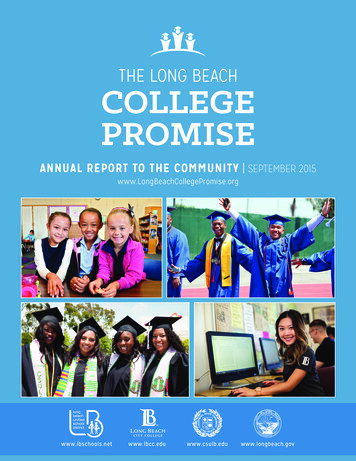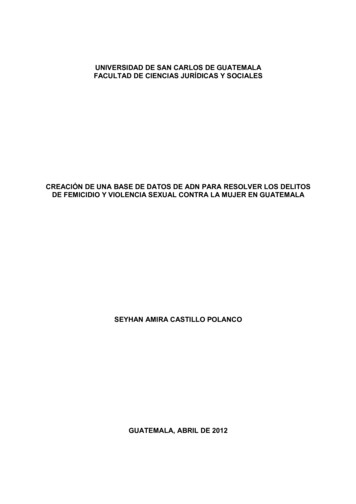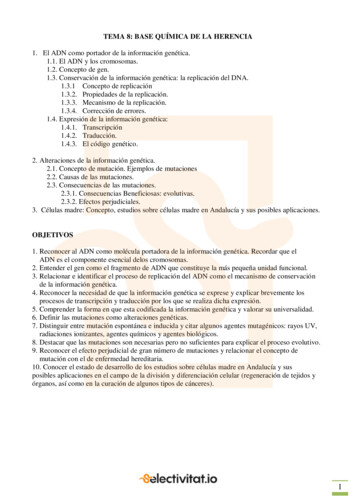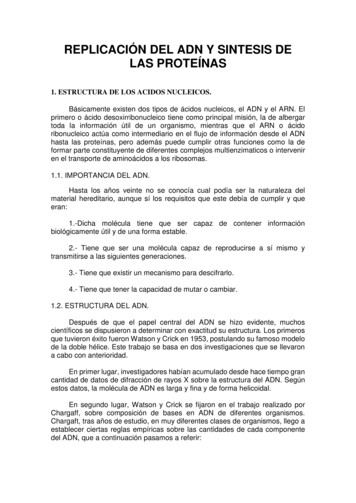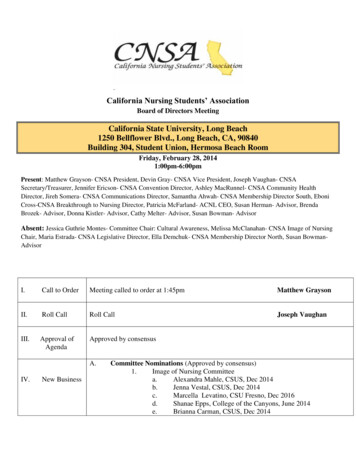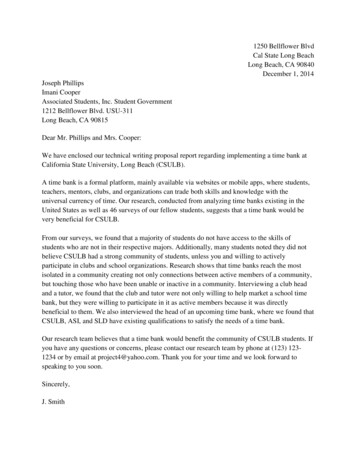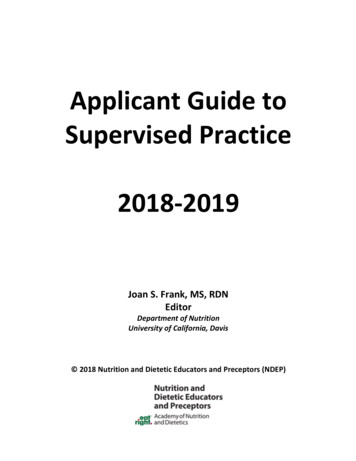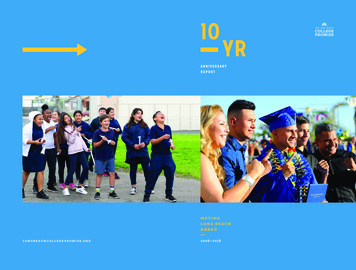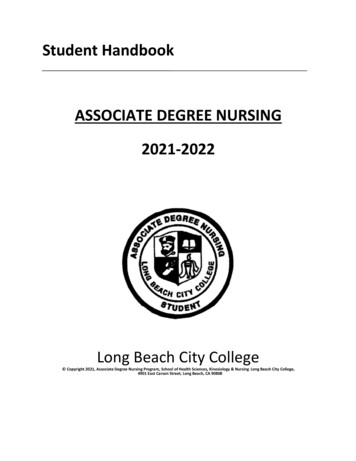
Transcription
iStudent HandbookASSOCIATE DEGREE NURSING2021-2022Long Beach City College Copyright 2021, Associate Degree Nursing Program, School of Health Sciences, Kinesiology & Nursing Long Beach City College,4901 East Carson Street, Long Beach, CA 90808
iPREFACE TO STUDENT HANDBOOKWelcome to Long Beach City College Associate Degree Nursing Program. The Student Handbook hasbeen developed to provide information needed by students in the ADN nursing program. Students areresponsible for the material contained in the handbook that is in effect when they are admitted to thenursing program. Reentry students will be held responsible for the contents of the Student Handbookin effect on the date of reentry. Any subsequent changes will be posted and sent out as an emailannouncement. Students will then be held accountable for any amended information. We hope thesepolicies will provide clear guidance to be successful in the ADN program.Maricela Arnaud, DNP, FNP, RNProfessorJeanne Ruehl, MSN, FNP, EdD, CNE, RNProfessorJulie Bean, DNP, RNProfessorSigrid Sexton, MSN, RNProgram Director/ Department HeadJohn Hawry, MSN, RNProfessorSophary Toich, MSN, RNProfessorFrances Outhwaite, DNP, FNP, RNProfessorRonda Wood, EdD, MN, RN-BC, PHN, CNEProfessorColleen Peralta, DNP, RNProfessor, Assistant Program Director
iiLong Beach Community College DistrictLONG BEACH CITY COLLEGEAssociate Degree Nursing ProgramTABLE OF CONTENTSMISSION/PHILOSOPHY OF NURSING AND NURSING PRACTICE . 1Humanity . 1Art and Science of Nursing . 1Nursing Education. 1PROGRAM LEARNING OUTCOMES AND OBJECTIVES . 3PROGRAM OPTIONS . 5Associate Degree Nursing Program . 5LVN to RN Career Ladder Program . 5Thirty (30) Unit Option Certificate Program . 5LIMITATIONS ON LICENSURE . 6STANDARDS OF ETHICAL AND LEGAL BEHAVIOR FOR THE STUDENT NURSE . 8Academic Honesty Policy . 9Family Educational Rights and Privacy Act (FERPA) . 11Request to Release Student Information . 12Oath of Confidentiality . 13Medical Expenses and Personal Loss Statement . 13Malpractice Insurance Statement . 13Student Handbook Statement . 13ASSOCIATE DEGREE NURSING ORGANIZATION . 14Faculty . 14Teaching Team . 14Program Director/Department Head . 14Assistant Program Director . 14Student Representation. 14Associate Degree Nursing Program Faculty Organization . 15Faculty Organization Committees . 15Nursing Program's Advisory Committee . 16Health Care Associates . 16LBCC NURSING STUDENT ASSOCIATION (LBCC NSA) . 17
iiiNURSING AND ALLIED HEALTH LEARNING CENTER . 18Testing . 18Computer Room . 19Learning Center Rules . 19SKILLS LABORATORY . 20Sign-in Procedure . 20Supervised Practice . 20Testing Procedures . 20Skill Laboratory Rules . 21POLICIES FOR STUDENTS . 221. ATTENDANCE . 222. CLASSROOM RULES AND REGULATIONS . 233. CLINICAL RULES AND REGULATIONS . 233.1 Jewelry . 233.2 Hair . 233.3 Nails . 243.4 Make-Up . 243.5 Cologne . 243.6 Footwear . 243.7 Facial Hair . 243.8 Gum Chewing . 243.9 Uniforms . 243.10-3.13 Clinical Behaviors . 253.14 Simulated Hospital . 253.15 Campus Lab, Skills Lab and Simulated Hospital Policies . 253.16 Campus Lab, Skills Lab and Simulated Hospital Attire . 263.17 Simulated Hospital Consent. 274. INSURANCE . 285. EVALUATION . 285.1 Grading Policy . 295.2 Quizzes - Make-up quizzes and Quiz Review . 295.3 Standardized Nursing Tests . 295.4 Course Projects and Computerized Programs . 295.5 Course Submodule Policy . 305.6 Written Work and Individual Projects . 305.7 Medication Administration Proficiency . 315.8 Program/Clinical Facility Required Submodules . 335.8.1 Individual Clinical Facility Required Submodules . 335.9 Progress Reports . 335.10 Clinical Evaluation Process. 335.10.2 Skill Testing/Retesting/Campus Laboratory . 335.10.3 Clinical Evaluation . 345.10.4 Clinical Ratings . 355.10.5 Satisfactory Clinical Rating . 365.10.6 Mid-Course Clinical Marginal Rating . 36
iv5.10.7 Overall Marginal Clinical Rating . 365.10.8 First Clinical Marginal Rating for a Course . 355.10.9 Second Clinical Marginal Rating for a Course . 365.10.10 Unsatisfactory Clinical Rating . 366. GRIEVANCE POLICY . 367. PROGRESSION AND RETENTION FOR STUDENTS IN THE PROGRAM . 388. POLICY FOR RE-ENTRY TO THE ADN PROGRAM . 388.1 Limitations on re-entry . 398.2 Student responsibilities prior to re-entry . 398.3 Re-entry Committee . 409. SUBSTANCE USE POLICY . 4010. STANDARD PRECAUTIONS . 4010.1 Statement of Policy . 4010.2 Guidelines for Dealing with Accidental Exposure to Body Substances . 4111. HEALTH AND SAFETY REQUIREMENTS . 4212. BACKGROUND CHECKS . 4313. TEAS SCORES . 4314. FINANCIAL AID . 4315. COMPLETION AND GRADUATION AND APPLICATION FOR NCLEX-RN . 4416. NCLEX-RN . 44Nursing Pins . 44Class Plaque . 44Nursing Caps . 44Completion Ceremony . 44Graduation Ceremony . 45Announcements . 45
1ASSOCIATE DEGREE NURSINGMISSION/PHILOSOPHY OF NURSING AND NURSING PRACTICEADN PROGRAM MISSION STATEMENTThe Long Beach City College nursing program provides a high-quality nursing education to qualified anddiverse students. The program facilitates the development of entry-level nurses who are prepared tomeet the evolving healthcare needs of the community. The faculty support a student-centeredenvironment of collaboration, communication, safety, excellence and compassionate nursing care.ADN PROGRAM PHILOSOPHYOur philosophy supports Orem's Self-care theory and the nursing process in developing and guidingthe curriculum content. The ADN Program nursing philosophy is comprised of the following:HumanityThe faculty view individuals as complex beings with biophysical, psychosocial, emotional, spiritual,and cultural needs. As members of society, individuals are deserving of respect for their innatehuman uniqueness. People are capable of taking an active role in providing their own self-care. Thefaculty believes that individuals are rational and social beings who interact with their environments.The faculty believes that individuals are human beings who continuously contribute to their ownhealth and well-being. All humans practice self-care activities that are initiated and performed ontheir own behalf in maintaining life, health, and well-being. Nursing and other health services areused when individuals are incapable of continuous self-care. Nursing systems are formed whennurses use their abilities to prescribe, design, and provide nursing for individuals by performingdiscrete actions. These actions regulate the value of the individual's capabilities to engage in self-careand meet the self-care requisites of the individual therapeutically.Art and Science of NursingThe faculty believes that the practice of nursing is an art and science based on biological, physical,learning and nursing sciences. The faculty believe that the art of nursing is practiced by 'doing for' theindividual with a disability, by ‘helping him to do for himself and/or by helping him to learn to do forhimself'. The faculty believes nursing is a holistic endeavor and seeks to help patients achieve anindependent state of well-being/self-care based on individual differences and respect for humandignity.Nursing EducationThe faculty is committed to an educational philosophy that emphasizes demonstrated competencyboth theoretical and clinical, utilizing a simple to complex learning approach. Learning is a lifelong,self-initiated process by which knowledge, skills, attitudes, and values are acquired. Learning occursindependently through perception, assimilation, formulation, and synthesis. The program is designedto meet the educational needs of an ethnically and culturally diverse population of learners byrecognizing their diverse learning styles. The faculty prepares students for the present and futurenursing needs of the community within ever changing healthcare delivery systems utilizing a
2multidisciplinary approach. The faculty fosters learning by encouraging the utilization of currenttechnology and all available support systems.The faculty believes that evidence-based teaching and practice is critical to the successful productionof safe practitioners and professional nurses. The professional role of the nurse is embraced andtaught with an emphasis on critical thinking, communication, and collaboration. As a patientadvocate, the nurse is responsible for managing all aspects of patient care and coordinating optimalpatient outcomes with consideration to the various multicultural needs of and diverse backgroundswithin the community.Core ConceptsWe believe that the Associate Degree nurse is prepared to fulfill an important role in providing quality,cost-effective nursing care within the current and future healthcare delivery systems. The facultybelieves that the practice of nursing is based on the National League for Nursing educational outcomesas well as the Quality and Safety Education for Nurses related to the core components of associatedegree graduates. The following concepts are introduced in the first nursing course and are integratedthroughout the program: Professional Role Communication Orem’s Self-Care Theory as it relates to the Nursing Process Critical Thinking Safety Teaching and Learning Collaborative Management of CareStudent Handbook Revised 8/2021
3END OF PROGRAM STUDENT LEARNING OUTCOMESUpon completion of the nursing program, the graduate will be able to:Clinical reasoning, Nursing Process and Evidence Based Practice Integrate evidence supported clinical reasoning and the nursing process into clinical practice.Communication Utilize therapeutic and culturally competent communication in the collaborative careenvironment.Safety Exhibit safe practice in the delivery of patient-centered care.Teaching and Learning Develop an individualized patient teaching plan.Professional Role Deliver care in a professional manner.Student Handbook Revised: 8/2020
4PROGRAM LEARNING OBJECTIVESIn addition to meeting the specific objectives for each course, the graduate of the Long BeachCity College Associate Degree Nursing program will be competent in the following learning objectives:Professional Role Support the ethical, legal, and regulatory framework of nursing, be a positive role model, andact as a patient advocate to ensure patient safety. Manage nursing care given by self and or delegated to others while maintaining appropriateprofessional boundaries and confidentiality. Value every individual as a unique, complex being with diverse emotional, cultural, and spiritualneeds and respect/protect patient privacy.Communication Support therapeutic communication skills when interacting with patients and family, andemploy effective communication skills in collaborating with the multidisciplinary healthcareteam Analyze and synthesize relevant, accurate, and complete information in a concise andstandardized manner by utilizing channels of communication and information technology toachieve positive patient outcomes.Orem Self-care Theory as it relates to the Nursing Process Integrate Orem’s Self-Care Theory to recognize each patient’s health deviation as an actual andpotential health problem.o Justify this framework as a basis for the provision of care in conjunction with the nursingprocess. Organize all aspects of the nursing process to prioritize and re-evaluate patient needs in avariety of health care settings.Critical thinking Appraise information, problem solve, and make decisions regarding patient care within themultidisciplinary team. Synthesize nursing research to integrate evidence-based practice and continue to pursue lifelong learning to ensure safe, patient centered care.Safety Manage patient care in a safe manner at all times; predict and alleviate potential health hazards. Assess for unsafe practices and devise a plan to ensure patient safety as the priority. Devise strategies to integrate quality improvement findings and technology into clinical practiceto promote collaboration and achieve optimal patient outcomes.Teaching/Learning Select opportunities to act as a patient educator utilizing the nursing process as a means tofocus on the needs of the patient, family, and community members in a variety of health caresettings. Devise strategies to integrate quality improvement findings and technology into clinical practiceto promote optimal outcomes.Student Handbook Revised 8/2021
5Collaborative Management of Care Value the expertise of each member of the multi-disciplinary health care team to ensure optimalpatient outcomes. Create a culture of teamwork and collaboration to promote open communication toindividualized patient care while protecting patient privacy.Student Handbook Revised 8/2021
6NURSING PROGRAM OPTIONSThere are three enrollment options in the Nursing Program. Curriculum guides can be found on theAssociate Degree Nursing website or the college website link at https://www.lbcc.edu/curriculumguidesASSOCIATE DEGREE NURSING PROGRAMSuccessful completion of this two-year program qualifies the student to take the National CouncilLicensing Exam - Registered Nurse (NCLEX-RN) given by state boards of nursing. The program satisfiesthe requirements for an Associate Degree in Nursing. The graduate, as a registered nurse, is qualifiedfor employment in acute care hospitals and many other health care facilities.LVN TO RN CAREER LADDER PROGRAMThe Career Ladder Program (Licensed Vocational Nurse to Registered Nurse Program) is designed tobe completed in three semesters. Students of this advanced placement program are integrated intothe Associate Degree Nursing Program and qualify to take the NCLEX-RN. The program satisfies therequirements for an Associate Degree. The graduate, as a registered nurse, is qualified foremployment in acute care hospitals and many other health care facilities.THIRTY (30) UNIT OPTION CERTIFICATE PROGRAMThe thirty (30) unit option program offered by Long Beach City College is a requirement of theCalifornia Board of Registered Nursing. By mandate, colleges must offer this option to any person whocurrently holds a valid LVN license and wishes to continue his/her education to obtain an RN license.This option does allow a person, upon completion, to sit for the NCLEX-RN. However, there arecertain limitations to this option.1.2.3.4.Students choosing this option are not considered graduates of the LBCC ADNProgram nor do they receive the Associate Degree in Nursing.Because the student is not a graduate, he/she may not participate in thecompletion ceremony or wear the LBCC nursing pin or cap.Being a non-graduate of an accredited program could create difficulties with futureeducational endeavors if the student wishes to attend a university that requiresapplicants to have completed an accredited program for their undergraduate work.Students choosing this option may not receive reciprocity when applying for alicense in other states.In order to comply with the limitation on units awarded for the 30-unit option, a 1.5-unit version of ADN45A and 1.5-unit version of ADN 45AL are offered. Students completing the 30-unit option will beassigned fewer clinical hours and will have a reduced assignment of lecture content in the abbreviatedversions of ADN45A and ADN45AL.Transfer students who have completed nursing program coursework at another institution are acceptedinto the ADN program after review of course equivalency and on a space available basis. Transferstudents are accepted after all reentry and LVN to RN students are accepted and at the discretion of theprogram director and the teaching team.Student Handbook Revised 8/2021
7LIMITATIONS ON LICENSUREBoard of Registered Nursing Policy Statement on Denial of LicensureThe California Board of Registered Nursing protects the public by screening applicants for licensure toidentify potentially unsafe practitioners. Statutory authority for denial of licensure is set out inBusiness and Professions Code section 480-489, 496, 810, 820-828, 2750-2765, and 2795-2797(Nursing Practice Act Rules with Regulations and related statutes, 2019).The law provides for denial of licensure for crimes or acts that are substantially related to nursingqualifications, functions, or duties. A crime or act meets this criterion if, to a substantial degree, itevidences present or potential unfitness to perform nursing functions in a manner consistent withthe public's health, safety, or welfare. (California Code of Regulations, Section 1444)A board may deny licensure on the basis of:1. Conviction of a crime substantially related to the practice of nursing.2. Any act involving dishonesty, fraud or deceit with intent to substantially benefit oneself oranother, or to injure another substantially.3. Making a false statement on the application for license.4. Breaching examination security.CONVICTIONSThe Board considers most convictions involving sex crimes, drug crimes and crimes of violence to besubstantially related to nursing practice. Board regulations list examples of such crimes or acts toinclude, but not to be limited to:1.2.3.4.Assaultive and abuse conduct.Failure to comply with mandatory reporting requirements.Theft, dishonesty, fraud and deceit.Convictions or acts resulting in registration under Section 290 of the Penal Code.REHABILITATIONIf the Board determines that an act or crime is substantially related to the practice ofnursing, it is the responsibility of the applicant to present sufficient evidence ofrehabilitation.When considering denial of license, the Board takes into account the following criteria to evaluate therehabilitation of the applicant. (California Code of Regulations, Section 1445).1.2.3.4.5.Nature and severity of the acts or crimes.Additional subsequent acts.Recency of acts or crimes.Compliance with terms of parole, probation, restitution, or other sanctions.Evidence of rehabilitation submitted by applicant.The Board has developed the following list of suggested evidence of rehabilitation for applicantswhose licensure is in question.It should be noted that the Board applies denial criteria for applications for interim permits andtemporary license as it uses for permanent licensure.Student Handbook Revised 8/2021
8In summary, the Board of Registered Nursing screens applications fairly but cautiously, applying theabove criteria. Schools of nursing are encouraged when counseling prospective nursing students tomake them aware that there could be potential licensure problems due to serious acts or convictionsas described above. In this manner, students have the opportunity to explore othe
Welcome to Long Beach City College Associate Degree Nursing Program. The Student Handbook has been developed to provide information needed by students in the ADN nursing program. Students are responsible for the material contained in the handbook that is in effect when they are admitted to the nursing program.

